Aaron Sorkin talks about making Camelot a parable for our times
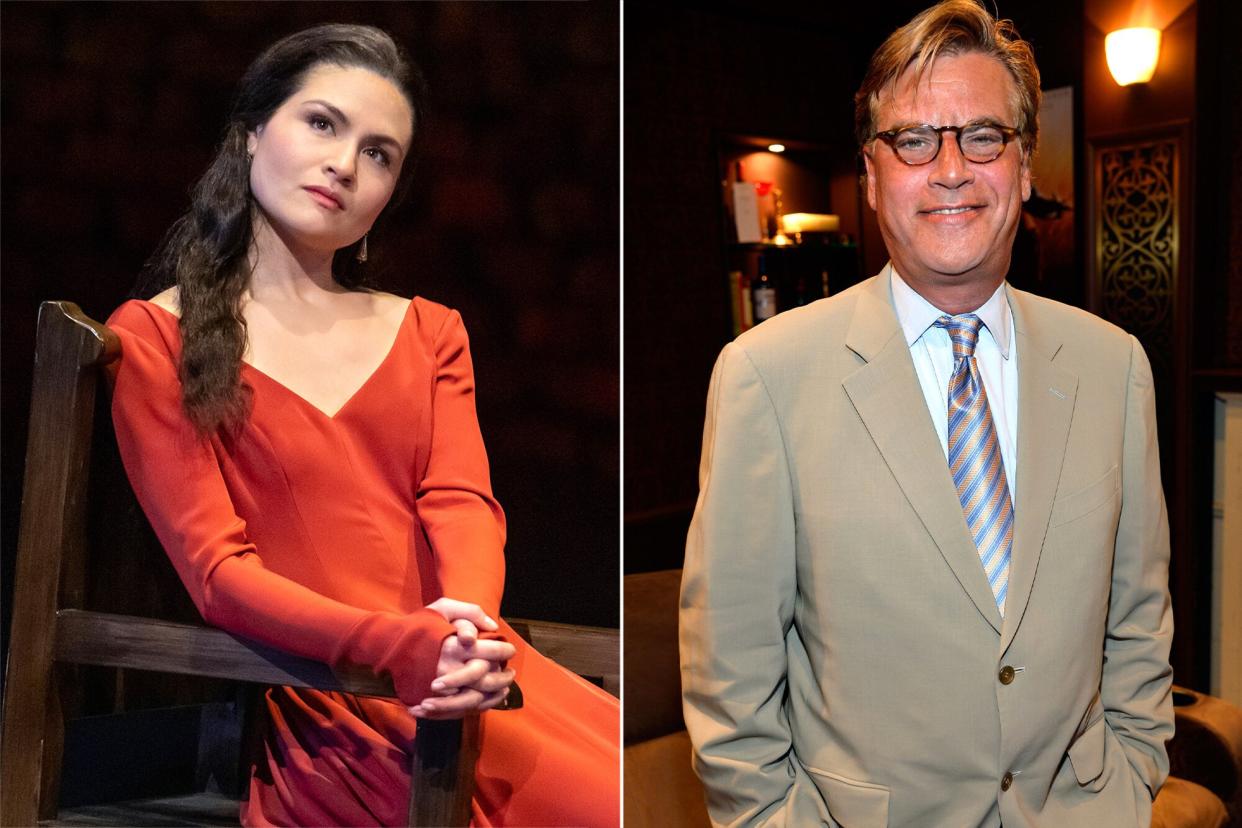
Aaron Sorkin is here to make sure that Camelot as a classic musical is not forgot.
The Oscar and Emmy winning writer has set his sights on King Arthur and his mythical roundtable in his latest work, revising the book of Alan Jay Lerner and Frederick Loewe's Camelot for a splashy Lincoln Center revival helmed by revival maestro Bartlett Sher (the two previously collaborated on Broadway's new adaptation of To Kill a Mockingbird).
Sorkin has earned a reputation of something of an idealistic writer with the aspirational politics in series such as The West Wing and The Newsroom. He happily embraces that label, and it's that quest for goodness that drew him to Camelot in the first place. "It was the theme of reach for the stars, of we can do better," he tells EW of his first interest in the project. "Even though we keep failing, try again. That notion is appealing to me. I like writing idealistically and romantically, and this certainly fit that category."

Joan Marcus; Frazer Harrison/Getty Images Phillipa Soo as Guenevere; playwright of the newly revised Camelot, Aaron Sorkin
The production, which opens April 13 on Broadway, continues the Lincoln Center Theater's streak of golden age musical revivals. It stars Andrew Burnap as the young Arthur, who through a political marriage to Guenevere (Phillipa Soo), the Princess of France, seeks to bring peace and prosperity to England. Together, Arthur and Guenevere develop the knights of the round table and their motto "might for right," but their plans are disrupted when Lancelot (Jordan Donica) arrives and brings his own internal struggle between his loyalty to Arthur and his love for Guenevere.
In advance of the show's opening, we caught up with Sorkin to talk about the complexities of rewriting a great American musical, why he thinks Camelot still has a vital message for audiences, and why he wanted to tell a version of Arthurian legend without any magic.
ENTERTAINMENT WEEKLY: Anyone who knows your work can easily recognize you're a musical theater lover. So why has it taken until now for you to write one?
AARON SORKIN: I am a musical theater lover. In fact, my college degree is in musical theater. I have a Bachelor of Fine Arts and Musical Theater from Syracuse University. Maybe I would've written one sooner, but the thing about writing a musical is you need collaborators. You need a composer and a lyricist, and it just never happened. So I was very happy when Bart Sher came along and asked me if I would write a new book for Camelot.
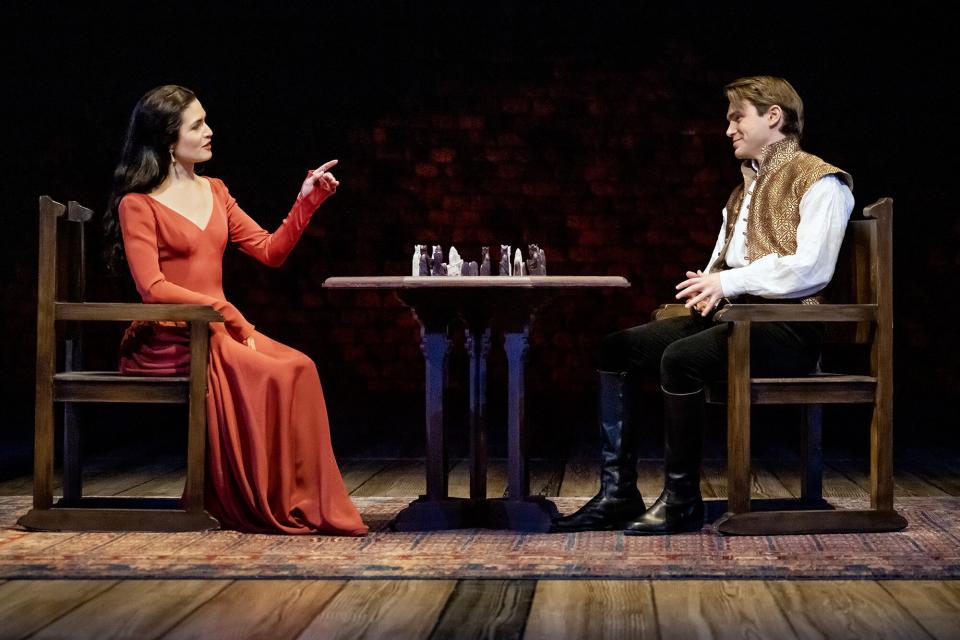
Joan Marcus Guenevere (Phillipa Soo) and Arthur (Andrew Burnap) play chess in 'Camelot'
Do you remember your first introduction to Camelot, but also more broadly Arthurian legend?
I've never seen Camelot. I've seen the movie, but I've never seen Camelot on stage. There are dozens, probably hundreds of versions of the Legend of King Arthur. It's been around for roughly a thousand years. I can't remember what my introduction to it was, what my first experience with it was. But what I do remember is reading reading the script for Camelot. And this isn't easy to say because I have so much respect for Lerner and Loewe. They're a legendary force in musical theater. But the book for Camelot doesn't work.
I loved Camelot when I read it. I thought it was a great story not very well told. The book has always been problematic. Apparently, Bart felt the same way. He had, a few years back, staged for Lincoln Center's gala a concert version of Camelot with Lin-Manuel Miranda playing Arthur. Bart and I had a terrific experience together doing To Kill A Mockingbird. He came to me and said, "Would you write a new book for Camelot?" It was a daunting thing to take on because it is part of musical theater history. The idea of rewriting Alan Jay Lerner isn't something you take on lightly. But I felt the same way that Bart did — that there was another draft to go. So I dove in.
What was it that made you want to tackle it?
That first meeting when Bart and I sat down to talk about it one thing that I knew I was going to do was that there was going to be nothing supernatural. The Camelot that Lerner and Loewe wrote has magic in it. Merlin lives backwards, and he can turn Arthur into a hawk so that Arthur can fly above the kingdom. Morgan La Fey is a witch who lives in an enchanted forest, and she can build an invisible wall to trap Arthur. There was going to be none of that. These were going to be real people who lived at a real time and a real place. It wasn't going to be Game of Thrones.
The reason I was eager to do that was that I just feel that this story, which lands so emotionally at the end, would land even better, even harder, if the people on stage were the same as the people sitting in the audience. If there was no magic wand to cure everything. If we can see that we're capable of being better, that we're capable of greatness. It seemed like a good thing to write about, particularly now.
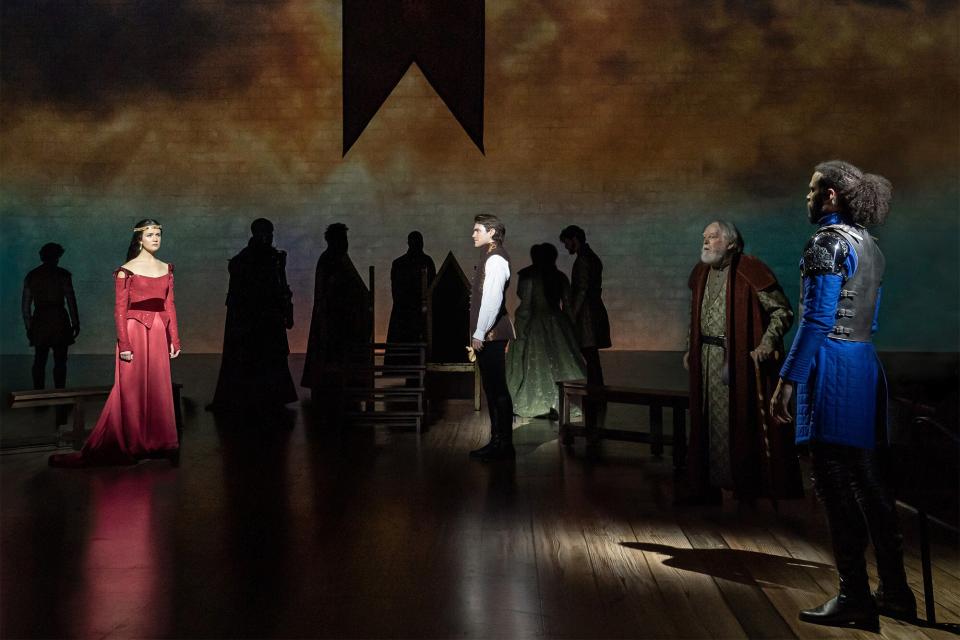
Joan Marcus Guenevere (Phillipa Soo), Arthur (Andrew Burnap), and Lancelot (Jordan Donica) face a difficult crossroads in 'Camelot'
How much of the original book would you say you kept, if any?
Well, not much. There were moments where I knew I wasn't going to do better than that. And I would write toward that great line that either Alan Jay Lerner wrote or they themselves adapted it from T.H. White's The Once and Future King. So there would be a line that T.H. White wrote that I thought, My job is to get there and set that line up. I'm not gonna do better than that. There are those moments. But by and large, I can't say a percentage for you. It's a new book.
You worked with Bart on To Kill a Mockingbird. He's directed a lot of these classic revivals of Golden Age musicals at the Lincoln Center. How is the experience different this time working with him? Because also, I think this is the first time he's done one of these musicals with a new book.
That is true. Although, My Fair Lady, for instance, it wasn't a new book, but he did work with the Lerner and Loewe estate to take some of what [George Bernard] Shaw had written in Pygmalion and weave it back into My Fair Lady. I think with South Pacific there was some racially sensitive stuff that had been cut out of town that he wanted to put back in. But nothing like this. This is a situation where I put the score out on the floor and wrote a new book.
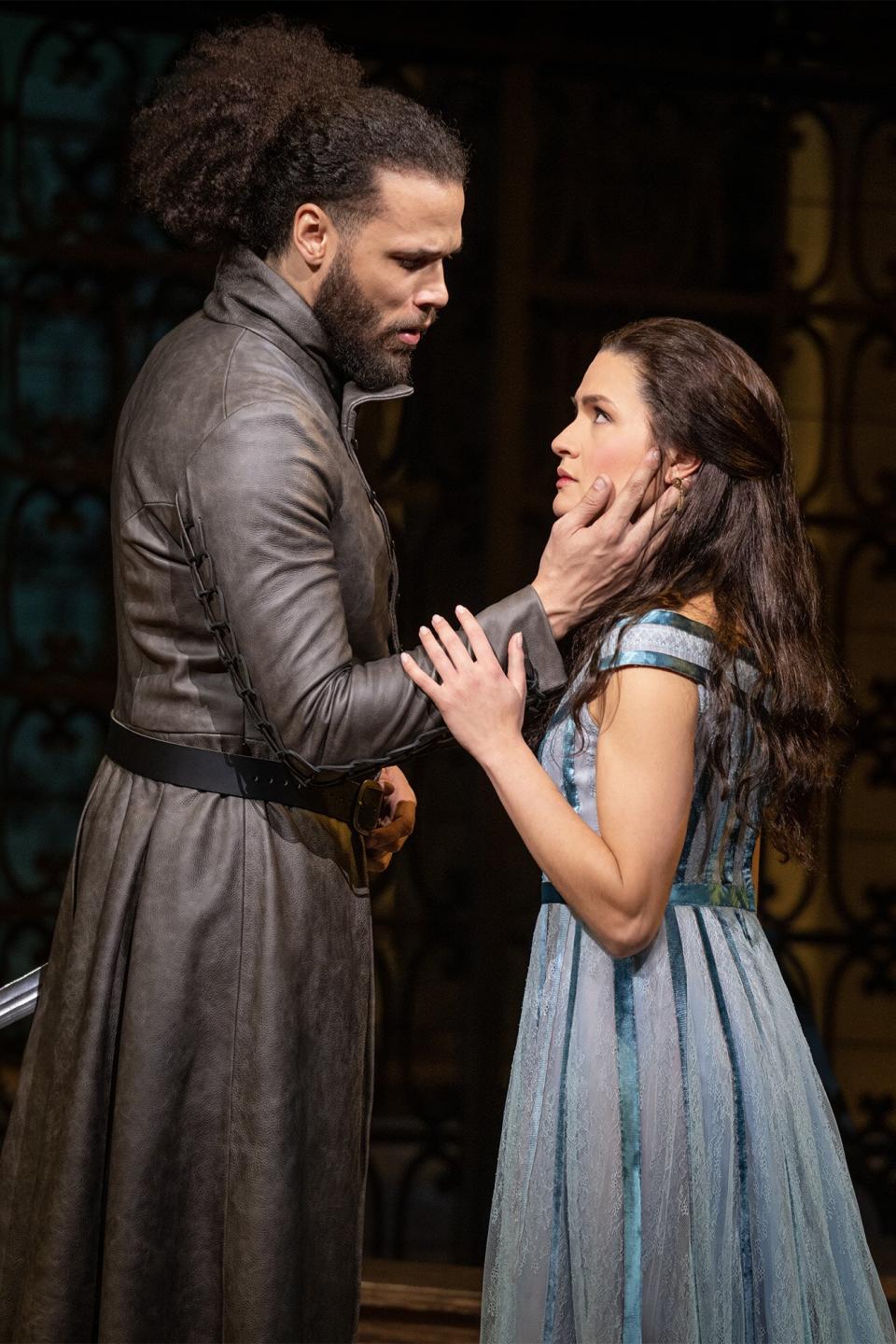
Joan Marcus Lancelot (Jordan Donica) confesses his love to Guenevere (Phillipa Soo) in 'Camelot'
Everyone sees you as a political writer. Is there something about this story, either in its original form or now, that you feel is inherently political? What do you think we can learn from Camelot today?
It's not that I have a political agenda. When I was in sixth grade, I had a crush on a girl in my class named Jenny Lavin. And Jenny Lavin was volunteering after school at the local McGovern for President headquarters. So I thought it would be a good idea if I did too. I was stuffing envelopes at the McGovern campaign headquarters, and one Saturday, they put all of us in a bunch of school buses and took us to the town next door because the Nixon campaign motorcade was coming through.
We were going to hold up signs that said McGovern for President, and I was holding up one of these signs when a 143-year old woman came up behind me, grabbed the sign out of my hand, whacked me over the head with it, threw it on the ground, and stomped on it. My only political agenda has been the slim hope that that woman is still alive and that I'm driving her out of her mind. I write from time to time about politics because there are good stories there and stories that fit. I like to write idealistically and romantically and aspirationally. I'm not trying to make a political point. What I'm hoping to do is — by the time the lights come back up — make you feel two inches taller than when you came into the theater. This, at its best, does that.
Here, Guenevere is the Princess of France, rather than a local maiden of unknown origin. What motivated that change for you? Was it about making her less of a damsel in distress or something else?
No. There are versions of the legend of King Arthur, where she's a simple maid, as you just said, and versions, which this is the version that we do, where she is part of a peace treaty between England and France. She's going to marry the King of England and become the Queen of England, and help keep the peace. That's more than just exposition in this version. It becomes part of the tragedy. Arthur admits to her finally that she was treated like a queen, but in fact, she was a hostage. She was a human moat. He needed peace between England and France in order to launch this idea that had been taught to him by Merlin of basically enlightenment.
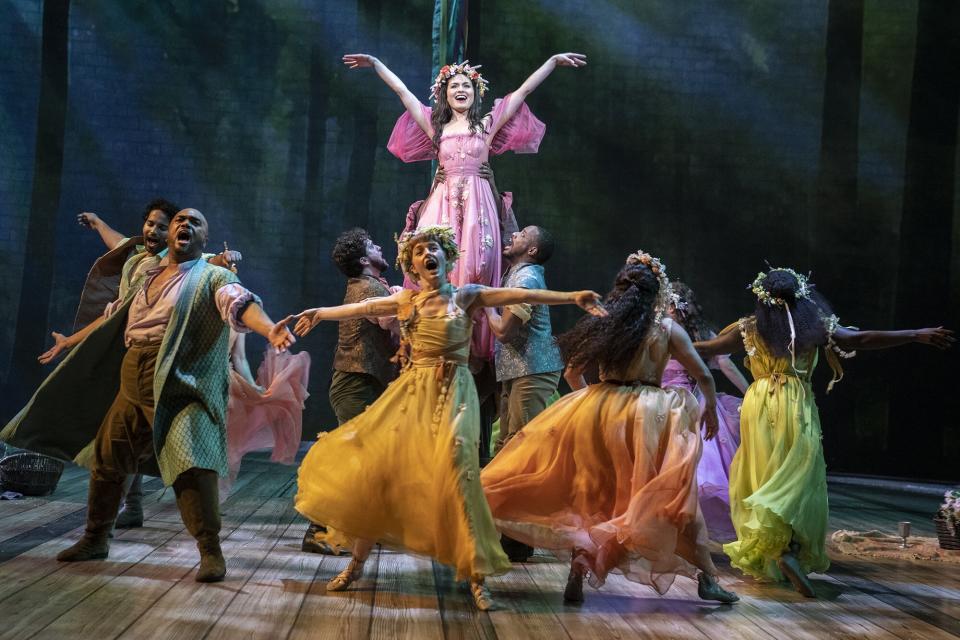
Joan Marcus Guenevere (Phillipa Soo) revels in the lusty month of May in 'Camelot'
But she is often a passive character and that's not true here. Was that something you wanted to counteract?
It's difficult to talk about this without insulting Alan Jay Lerner, which I can't tell you how much I don't want to do that. But in the Lerner script, I found both of them, not just Guenevere but Arthur too, oddly childlike. Not brilliant people by any means.I wanted them both to be smarter, and I wanted her to be his equal. She is now a co-author of the Roundtable. I wanted her to be truly invested. I wasn't doing it just to be current, in terms of equality. I was doing it also because if she is fully invested in it, the tragedy is going to land that much harder. And the smarter the character is, the more fun she is.
Both Richard Harris and Richard Burton were not particularly young men when they played Arthur. And they both looked older because of their drinking. But what made you want to lean into this younger Arthur? Because Andrew is very boyish looking.
He is. And in those early discussions with Bart, I had said, "Let's make them young." First of all, it was just going to make more sense if they were younger, in terms of the peace treaty. It was going to be weird that a king in his mid-thirties wasn't married yet. I didn't want a guy in his mid-thirties marrying a princess who was 20. So, I wanted them both to be young. But the biggest reason is that it's when you're young, that is when you are the most idealistic. This Camelot takes place over a shorter period of time. The original Camelot takes place over five or six years. This one takes place over 18 months. So to see that idealism get stamped out when they're that young, it hurts more.
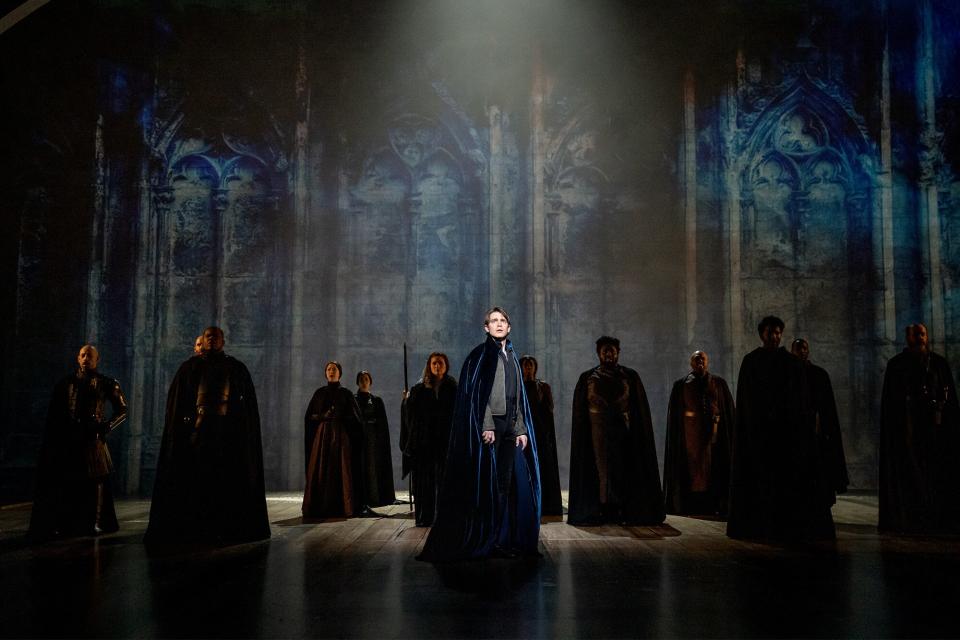
Joan Marcus Arthur (Andrew Burnap) looks to a murky future in 'Camelot'
Did you have a particular year in mind for the setting? Because we tend to think of this story as medieval or pre-medieval, but you have mentions of Christine de Pisan and Voltaire and others who are figures of the Renaissance and the Enlightenment.
Yes. The first stage direction in the script says that projected on the scrim we see "England," and then it's joined by "On the eve of the Enlightenment." That isn't a particular year. It's a particular century. It wasn't important to me that it be 1710. What was important to me was that we feel like the world is about to change.
You have changed the duel between Lancelot and Lionel to Arthur and Lancelot. Was that just about the magic, or did it feel dramatically stronger to you?
Originally, it's a joust. But you can't see a joust on stage. You can only have it described to you. I changed it to a broadsword fight because who doesn't like sword fighting. That's fun. Then, yes, Arthur substitutes in for Lionel because they're getting embarrassed. Then, by accident, Lancelot whacks him in the head. But the biggest change is that it used to be that Arthur is dead, but Lancelot, simply by putting his hand on his chest — and I guess somehow summoning the divine — brings Arthur back from the dead. But there can't be anything supernatural in this show, so it's simply that Arthur has been knocked unconscious and Lancelot holds his hand until he wakes back up.
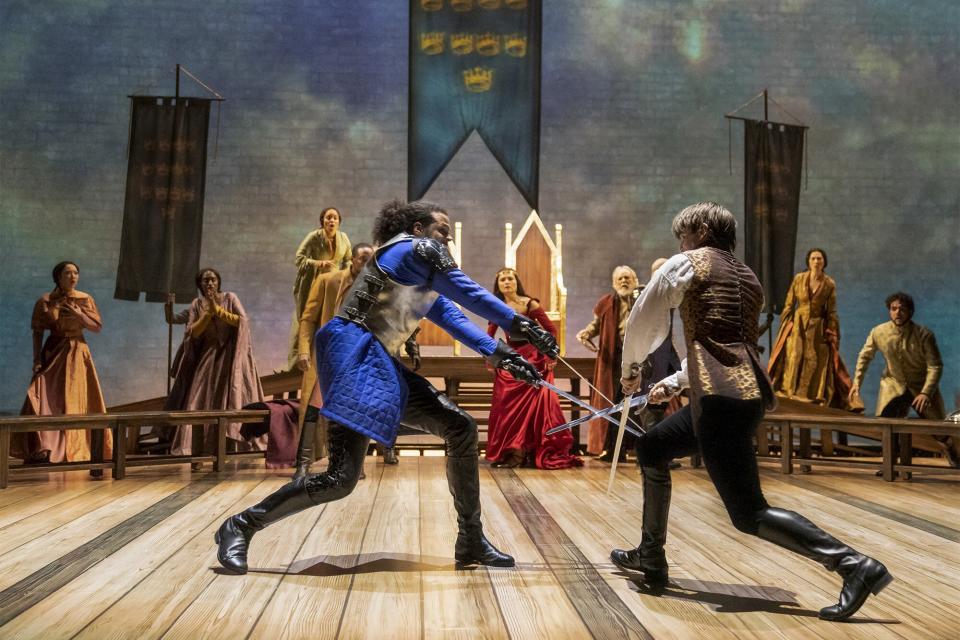
Joan Marcus Lancelot (Jordan Donica) and Arthur (Andrew Burnap) duel in 'Camelot'
Because of your resume, people might come into this expecting very strong ties to the JFK Camelot of it all. Was that something you and Bart talked about? Did you wanna nod to it at all?
It wasn't. The JFK of it all really wasn't part of this. And, you know, the JFK of it all really wasn't part of it back then. That was a Jackie Kennedy thing. He liked the show and he liked listening to the original cast album. After he was shot in '63, Jackie fanned the flame of Camelot.
The central tension here is that Arthur believes that human nature inclines to goodness and responds to inspiration, and Morgan counters with the idea that there will always be greed and justice, hate and horror. Who do you tend to side with more?
Personally? Oh, I side with Arthur, which I understand is soft. I side with Arthur. The hesitation that you're hearing in my voice is that no one has asked me this question before, and I'm just asking myself right now — do I only side with Arthur when I'm writing? Or do I side with Arthur all the time? I think I side with him all the time. Because it'd be hard to get out of bed if I didn't. I side with Arthur because my father would've sided with Arthur. The truth is that most of the time, most of the characters that I write — whether it's Arthur, the King of England, or Jed Bartlet, pretend president of the United States on The West Wing — most of the time, those characters are my father.
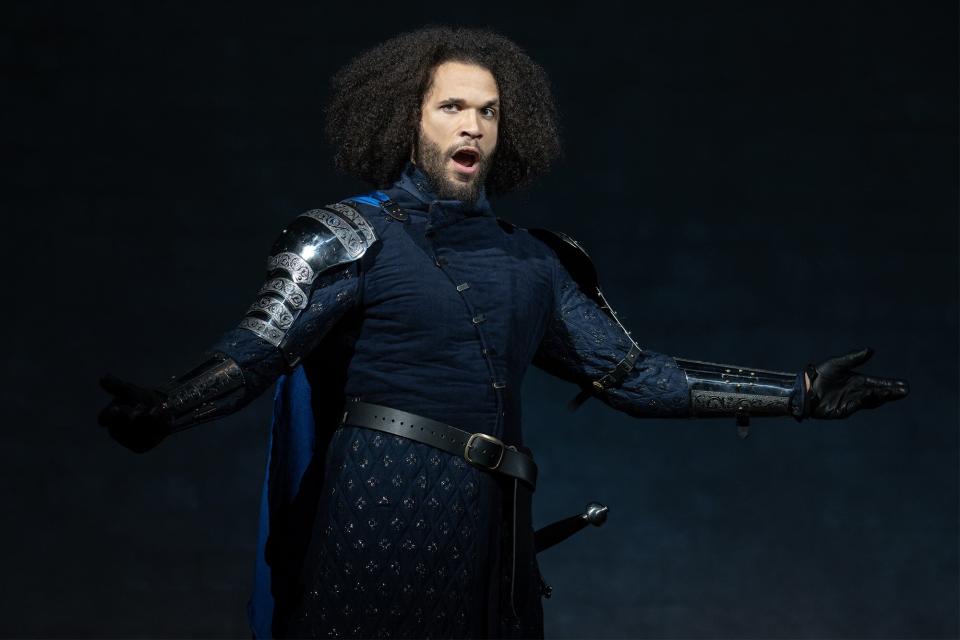
Joan Marcus Jordan Donica as Lancelot du Lac in 'Camelot'
This is a tragedy, but do you hope the audience walks away with some renewed belief in goodness?
I do hope so. It's a tough needle to thread at the end because it is a story with a sad ending that's supposed to make you feel good. It is a story with a tragic ending that is nonetheless aspirational. We put all our chips on a one page scene with a 12-year-old boy named Tom.
By that same token, we live in a world with what feels like a lot of hopelessness, particularly in our political climate. How did that color your approach and what you wanted to say here?
There's a line in the show that consistently gets a round of applause every night. I knew the line would land, I just didn't know it would land that hard. Morgan says, "Oh, you'd be amazed who people will follow." So, it didn't take much to get the audience thinking about today, and I'm glad about that.
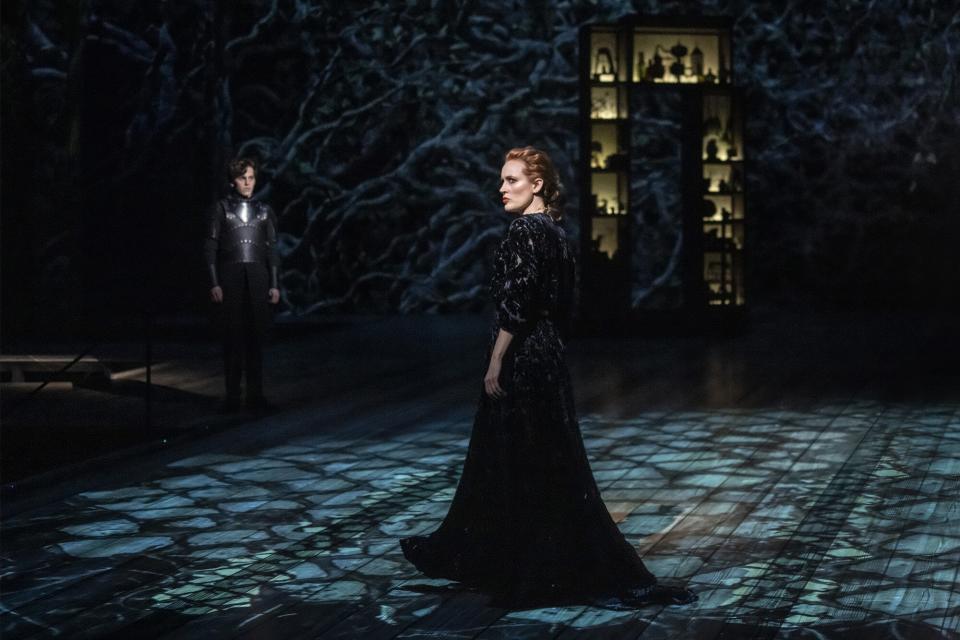
Joan Marcus Mordred and Morgan Le Fey in 'Camelot'
You took the magic out, but I still feel this tension here between people wanting to believe in magic versus reason and science. Was that something you wanted to explore because of the Enlightenment setting?
Every time people have greatness in their grasp, they assign that greatness to some sort of magic, some sort of supernatural force. You just said that people want to believe in magic. I don't think that's true. I don't want to believe in magic. I want to believe in the best of humanity.
Related content:

